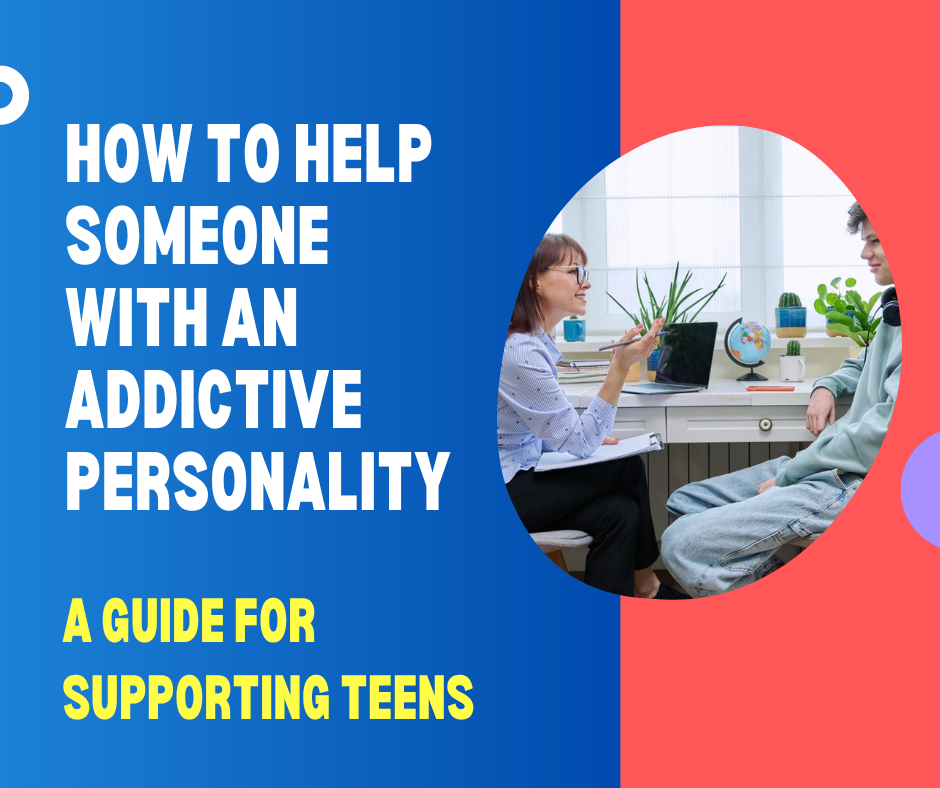How to Help Someone with an Addictive Personality: A Guide for Supporting Teens

By Horizon Recovery | https://www.horizonrecovery.com/
Watching a teen do battle with risky behaviors, habits, or substances is deeply concerning for any parent or guardian. When these patterns seem rooted in certain personality traits—like impulsiveness or difficulty managing stress—families often wonder, "Is this an addictive personality?" and, more importantly: How do I help my teen, and when should I ask for outside support?
At Horizon Recovery, we know this journey is overwhelming, but we also believe in hope, healing, and lifelong change for young people and their families. This guide will break down how to help someone with an addictive personality, with a special focus on teens—including what questions to ask, how to give space, and ways to encourage openness.
Understanding Addictive Personalities in Teens
An “addictive personality” is not a clinical diagnosis, but rather, a set of tendencies that make someone more likely to develop compulsive relationships with substances or behaviors (such as gaming, vaping, or risky activities) (Canadian Centre for Addictions, 2025). While many factors contribute, common characteristics include:
- Impulsiveness
- Risk-taking
- Difficulty managing stress
- Emotional dependency
- Obsession or preoccupation with activities (Foothills at Red Oak Recovery, 2023)
This combination, plus environmental influences like trauma, peer pressure, or family history, puts teens with addictive personalities at a heightened risk for teen addiction.
Recognizing Warning Signs: When Should You Worry?
Spotting problems early offers the best chance to change course. Warning signs include:
- Increased secrecy, withdrawal from family, or loss of interest in healthy activities
- Mood swings, irritability, or sudden changes in sleep/eating patterns
- Persistent cravings or compulsive behaviors—not just with substances, but things like gaming, spending, or social media
- Risk-taking or reckless behavior
If these patterns show up, especially alongside anxiety, depression, or trauma, it's time for a conversation (Horizon Recovery—Teen Mental Health).
Step 1: Opening the Conversation — What Questions Should Be Asked?
Empathetic, nonjudgmental dialogue is the gateway to help. Teens with addictive personalities are especially sensitive to shame, so use questions that invite honesty, not defensiveness.
Ask:
- “How are you feeling about what's been going on lately?”
- “I've noticed you've seemed more stressed/withdrawn—is there anything you want to talk about?”
- “Are you finding it hard to stop [behavior] even when you want to?”
- “Do you ever use [substance or activity] to cope with hard feelings or stress?”
Focus on listening. Reflect their words (“It sounds like you’ve been overwhelmed…”) and normalize the struggle (“Lots of people go through difficult times…”).
For more tips, see JADE Wellness Center’s strategies for supporting teens.
Step 2: Creating Safety, Trust, and Space
How do you get a teen to open up?
- Use non-confrontational language. Use “I” statements, not “You always…”
- Keep it confidential—promise not to overreact or share without consent, unless they're at risk.
- Check your own emotions first—approach calmly, not in the heat of frustration.
When do you give a teen space?
- If the conversation becomes heated or the teen shuts down, press pause: “We can come back to this when you’re ready.”
- Respect their autonomy—don't bombard with questions or force solutions.
- Offer regular, friendly check-ins rather than single, high-stakes talks.
Tip: Some young people process by texting, journaling, or walking—let your teen know these options are open.
Step 3: Build a Supportive Environment—Not Just “Tough Love”
Contrary to myths, research shows that warmth, consistency, and unconditional support (not punishment or shame) are vital for teens with addictive personalities (Psychology Today, 2025). Consider:
- Encouraging healthy coping skills: Exercise, art, music, volunteering, yoga, or mindfulness help redirect impulsive energy.
- Celebrating progress: Recognize every effort, whether it’s openness, a week of healthy choices, or joining a support group (Canadian Centre for Addictions, 2025).
- Setting boundaries—without enabling: Avoid rescuing your teen from consequences but remain a safe, steady supporter (WebMD, 2024).
Step 4: Know When—and How—to Seek Help
Some teens with addictive personalities need more than parental support. Indicators it’s time to seek outside help:
- Behaviors intensify and/or risk increases
- Co-occurring mental health struggles (anxiety, depression, trauma)
- Sudden academic, social, or health declines
What does professional help look like at Horizon Recovery?
- Holistic, evidence-based treatment: We combine clinical therapies (CBT, DBT), experiential therapies (yoga, art, mindfulness), and medication management if needed.
- Family involvement: Family sessions, education, and regular progress updates to help you become a powerful part of your teen’s recovery journey.
- Personalized continuum of care: From inpatient detox to aftercare planning, we address both addiction and any underlying issues.
Learn more about our approach here.
Step 5: Recovery as a Lifelong Journey
Recovery isn’t an event—it’s a process, filled with progress, setbacks, and growth. Teens with addictive personalities often need:
- Access to ongoing peer support (e.g., group therapy, community groups)
- Continued skill-building (resilience, stress management, boundary setting)
- Hope and compassionate accountability—celebrate even small victories, and remind your teen that setbacks don’t define their worth or ultimate outcome (Nemours KidsHealth, 2023).
If You're Unsure—You Don’t Have to Navigate Alone
Every family’s situation is unique. At Horizon Recovery, we offer confidential consultations for families concerned about teen addiction. We’ll listen, answer your questions, and help you understand your options—without pressure or judgment.
Key Takeaways:
- Approach with empathy, not blame
- Ask open-ended, caring questions
- Give space, but keep showing up
- Celebrate any and all progress
- Lean on experienced, holistic treatment providers for support
Recovery is possible. Your support—and the right resources—make all the difference.
References
- Canadian Centre for Addiction. Addictive Personality and Recovery
- Foothills at Red Oak Recovery. Signs of an Addictive Personality
- Never Alone Rehab. Identifying Substance Abuse in Teenagers
- JADE Wellness Center. 6 Effective Strategies for Supporting Teens in Addiction Recovery
- WebMD. Signs You’re Enabling a Loved One’s Addiction
- Psychology Today. Healthy Teens, Brighter Tomorrows
- Nemours KidsHealth. Dealing with Addiction (for Teens)
Ready to take the next step?
Contact Horizon Recovery for support, guidance, or simply to talk with a team that understands and cares.
More posts like this
.svg)
Guiding your teen’s path to mental clarity, sobriety, and a hopeful future.
For more information or to schedule a visit, please reach out to us today. Our empathetic and caring team is here to support you every step of the way.
.svg)
.avif)
.svg)
.svg)


.jpg)
